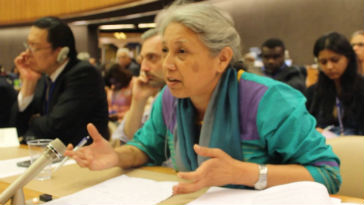National voices from the cooperative movement at the International Labour Conference 2016

Would you introduce yourself and explain what brought you to the International Labour Conference 2016?
My name is Elizabeth Nzilani Peter from Kenya. I work in a coffee cooperative in Kenya, Machakos Cooperative Union Ltd. I am at the ILC representing Homeworkers’ Working Group in Africa (which includes workers from Kenya, Uganda, Ethiopia and South Africa) under WIEGO (Women in Informal Employment: Globalizing and Organizing) promoting decent work in the global supply chains through recognition and visibility of homeworkers.How do you see the role of the secondary cooperative organizations in the global supply chains? How can these organizations promote the achievement of decent work in global supply chains?
Cooperatives are very key in the global supply chains, as they form part of the organization, elimination of middlemen to increase efficiency and benefits to their members. They can promote decent work because they integrate their values and principles into the supply chain and not just reap the economic benefits. They offer decent employment and jobs, and enable the farmers to access market information, technology and finances.Would you talk about your experience at the ILC? What discussions are you following? What do you expect out of your participation in these discussions?
I am following the decent work in the Global Supply Chains discussion. This being my first time attending the ILC my experience has been eye-opening. I was able to see issues in a different perspective especially on the global supply chains. “It’s not business as usual", as the Government speaker from Kenya stated in the Workers Group meeting.My expectation out of this discussion is recognition and visibility of the homeworkers and support from trade unions and governments. Recognition of cooperatives’ role in the global supply chains is key as they improve returns to their members and improve labour conditions.

Would you introduce yourself and explain what brought you to the International Labour Conference 2016?
I am Prabha Pokhrel, chairperson of Home Based Workers Concern Society Nepal (HBWCSN), an NGO actively working to establish recognition, visibility, rights, dignity, and welfare to home based workers in the last 15 years. Our NGO has been playing the role of catalyst to ensure decent working conditions and equal labour rights for them. It has been lobbying with the government for enforcing these conditions are met and at the same time facilitating home-based working sisters to access, sustain, and increase remunerationWe also helped start and strengthen nine cooperatives, two NGOs, and ten self-help groups (pre-coops) of women homeworkers with a cumulative membership of 3,500 members in seven districts (Kathmandu, Lalitpur, Bhaktapur, Nuwakot, Syanja, Sunsari and Morang). Members associate in these groups based on their skills, and work on different sectors, such as sewing, knitting, embroidery, bead making, wool work, Dhaka cloth weaving, spinning wool, bio-briquette production, wood craving, Tibetan handicraft, incense sticks and many others. With the facilitation of their cooperatives and HBWCSN, around 5 per cent of the members transition from being home-based workers to small businesses each year. Some of them now generate employment for up to 20 other home workers.
HBWCSN supports, capacitates, enhances market based skills and supports in the institutionalization of these groups. Until now it has provided skills enhancement training to more than 2,000 women in different skills, including technical, leadership, negotiation, and IT skills. HBWCSN has also been advocating home-based workers’ rights recognition and ratification of the Home Worker Convention, No.177 (1996) through rallies, awareness-raising and discussion events, lobbying, submitting letters to concerned Government offices, showcasing Nepal's issues in different national and international fora, and supporting the preparations for the Kathmandu and Delhi Declarations on Home Work, among others.
Recovering from the 2015 earthquake has been a herculean task for all the affected communities. Displacement by the earthquake has added many more home-based workers in and around the cities. The mechanism of organizing and supporting their livelihood is already in place, and HBWCSN intends to expand its support to these earthquake victims also.
HBWSCN has been operating its activities with its own resources and minimal external support across these years. However we have engaged closely with Women in Informal Employment: Globalizing and Organizing (Wiego) and HomeNet South Asia as affiliates, during Kathmandu and Delhi Declarations, celebrating 20th anniversary of the Convention No. 177 and other projects and campaigns for home-based workers’ rights, recognition and welfare.
The opportunity to learn on the burning issue around the supply chains in the world concerning decent work and the drafting procedure, and also to showcase the persistent and unique issues of home-based workers in Nepal were the main reasons behind accepting the invitation to represent HomeNet South Asia in the International Labour Conference.
How do you see the role of a cooperative support institution of home-based workers such as yours in the global supply chains? How can organizations like yours promote the achievement of decent work in global supply chains?
In our experience helping organize self-help groups into cooperatives has been an effective model for retaining, and economic uplifting of home-based workers. All or experience and consultations shows sustaining and growing home-based and other informal workers’ organizations and businesses is a critical area of need. Often workers in the informal economy are scattered, not recognized nor accounted for and do not have access to financial services from mainstream financial institutions. They lack voice and negotiation power rendering them vulnerable and dependent on the only accessible means of livelihoods.As workers in the lowest ranks of the global supply chain, homeworkers have benefited from cooperatives by having collective voice and negotiation power with middlemen (buyers) as well as suppliers and policy makers for better piece rates. Cooperatives have provides a range of much needed services to them where they practice joint ownership and democratic decision making, and receive financial support through easy/accessible/low interest loans. Through the cooperatives they did not only build their skills and confidence, but also attracted business as the joint production allows for quality controls and creates economies of scale. Therefore in our work I see cooperatives as most suited to securing rights for the workers and producers at the bottom of the global supply chain.